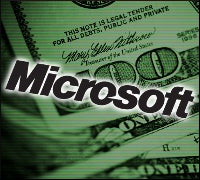 |
In a rare move, Microsoft issued private debt to the tune of $3.75 billion on Tuesday, rather than going to its own gold-lined coffers for cash. But for what?
While the rumor mill sizzled with speculation that Microsoft (NASDAQ: MSFT) needs the money to make an offer for German firm SAP (NYSE: SAP), CEO Steve Ballmer did his best to let the hot air out of that balloon.
“I have nothing to say about rumors of acquisitions … positively or negatively,” he told reporters in Mumbai, India, when asked about a Microsoft acquisition of SAP, according to Reuters. “It strikes me as a random rumor.”
The same article also said that co-CEO of SAP Leo Apothekar emphasized his opinion that his company should remain independent, tossing more water on the acquisition theories.
In a statement, Microsoft said that the cash it raised through sale of the bonds might be used for “working capital, capital expenditures, repurchases of stock and acquisitions.”
“The notes consist of … $2 billion of 2.95 percent notes due June 1, 2014, $1 billion of 4.20 percent notes due June 1, 2019, [and] $750 million of 5.20 percent notes due June 1, 2039,” the company said.
In fact, though, the offering is no surprise. Microsoft notified stockholders it was planning a debt offering late last year, though at that time it didn’t say what the funds would be used for.
Ultimately, said one analyst, it’s nearly impossible to guess what Microsoft will do with the money — particularly since it’s still got some $25 billion in the bank that it could spend instead, if it wanted.
“They’ve been very tight-lipped about it [although] it might be for share buybacks,” Matt Rosoff, research vice president for corporate news at Directions on Microsoft, told InternetNews.com.
The money, or part of it, could be used for acquisitions, Rosoff conceded. Other than its $6 billion acquisition of online ad company aQuantive in 2007, and its failed offer to buy Yahoo for as much as $44.6 billion last year, most of Microsoft’s acquisitions have been relatively modest.
“They’ve never done an acquisition that was more than they had cash on hand,” Rosoff said. In the bid for Yahoo (NASDAQ: YHOO), however, Microsoft CFO Chris Liddell said the company would likely take on debt in order to partially finance the purchase. The deal fell through, though, and that option was never exercised.
So what about using some or all of the cash for Microsoft’s stock repurchase plan?
For one thing, money is cheap these days and so is Microsoft stock, which closed Tuesday at $19.89. In the past year, the stock rose as high as $30.53, according to Yahoo Finance. Microsoft has typically had an aggressive stock buyback program.
“They’ve bought back shares pretty much every quarter over the last five years,” Rosoff said.
But that didn’t happen in the company’s third fiscal quarter, which ended March 31, he pointed out.
With both interest rates and the stock price low, now may simply be a good time to pick up shares at a bargain price. Besides that, the company has a multi-year commitment to repurchase as much as $40 billion worth of its own stock so this could be an effort to get a bargain on both ends of the deal.
The money could even be for operating expenses. For instance, some of the cash might be used to fund marketing and advertising for Windows 7, which is due out this fall.
All that said, however, Rosoff was still reticent to commit. “There’s no way to guess,” he added.


